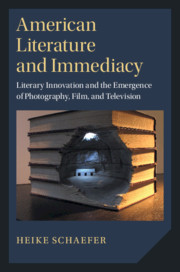 American Literature and Immediacy
American Literature and Immediacy from Part III - Literary Immediacy and Television
Published online by Cambridge University Press: 19 December 2019
Taking its cue from Raymond Federman’s programmatically titled essay “The Last Stand of Literature,” the chapter briefly reviews the critical debate about the increasing convergence of literary and television culture. Rather than seeing the influx of TV aesthetics into American literature as causing a demise of literary culture, the chapter argues that the texts by Coover, Wallace, and DeLillo imaginatively reframe TV culture and turn the reflection on visual media into a source of literary innovation. They acknowledge TV as a central force in postmodern culture, rework televisual immediacy effects, and describe TV images and their reception, but they do so in self-reflexive narratives that probe the contributions literature can make to a culture shaped by TV and the commodification of art and experience.
To save this book to your Kindle, first ensure [email protected] is added to your Approved Personal Document E-mail List under your Personal Document Settings on the Manage Your Content and Devices page of your Amazon account. Then enter the ‘name’ part of your Kindle email address below. Find out more about saving to your Kindle.
Note you can select to save to either the @free.kindle.com or @kindle.com variations. ‘@free.kindle.com’ emails are free but can only be saved to your device when it is connected to wi-fi. ‘@kindle.com’ emails can be delivered even when you are not connected to wi-fi, but note that service fees apply.
Find out more about the Kindle Personal Document Service.
To save content items to your account, please confirm that you agree to abide by our usage policies. If this is the first time you use this feature, you will be asked to authorise Cambridge Core to connect with your account. Find out more about saving content to Dropbox.
To save content items to your account, please confirm that you agree to abide by our usage policies. If this is the first time you use this feature, you will be asked to authorise Cambridge Core to connect with your account. Find out more about saving content to Google Drive.